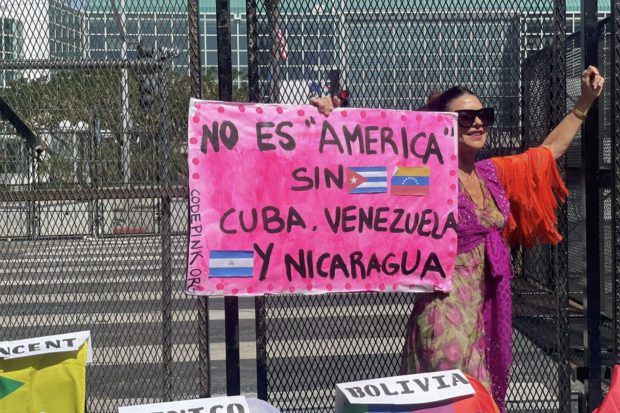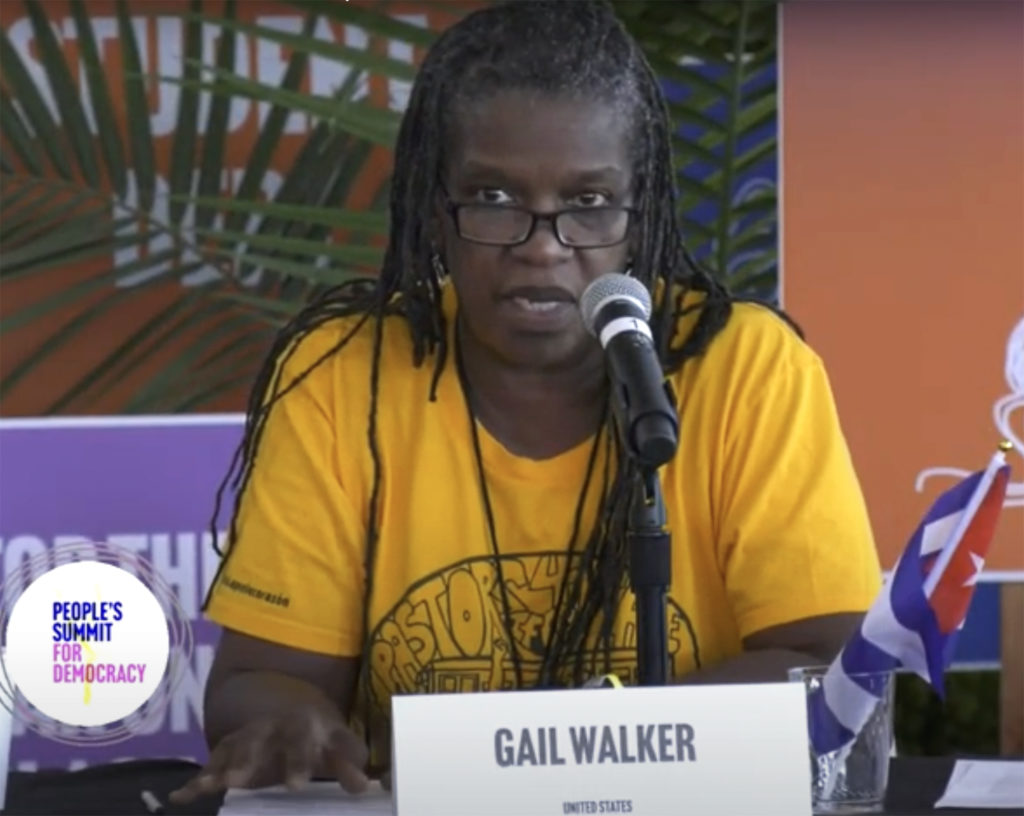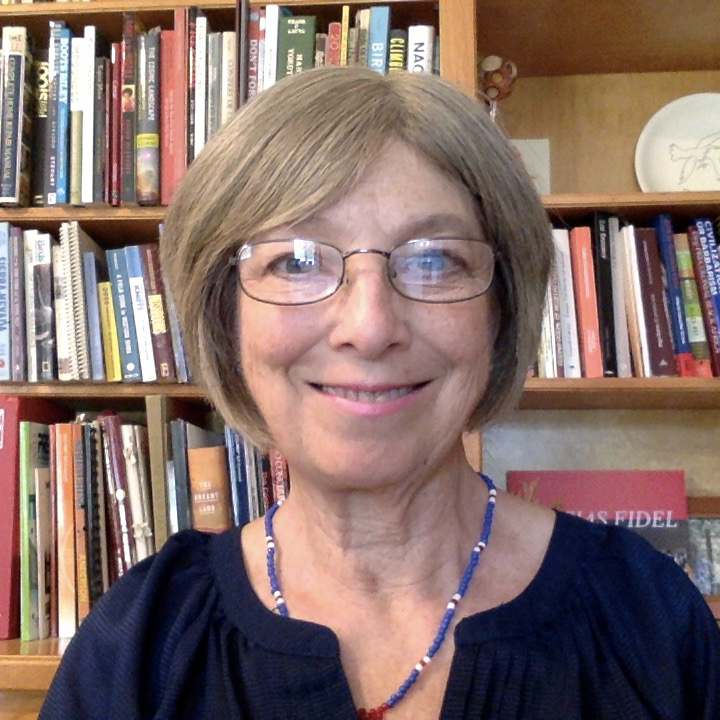

While the U.S. government seeks to shape the world for its own financial and political benefit, the oppressed and struggling people within the United States and elsewhere know that they have the right to determine their own societies and their own futures.
The people and many governments of the Américas rejected U.S. neocolonial power and U.S. attempts to define worthy representatives of the Américas as only those willing to follow the U.S. line and admit U.S. corporate exploitation of their countries. Cuba has led the way and provided an example, both of the possibility of resistance and the consequences that will follow.
On June 6, two summits began in Los Angeles. The Ninth Summit of the Américas was an interesting mess, as President Joe Biden decided that somehow the U.S. government had the authority to decide which countries would be included in the Américas.
Maybe it’s the habit of calling the United States “America.”
Maybe it’s the Monroe Doctrine.
Maybe it’s the legacy of almost two centuries of imperialist intervention. The United States first invaded Mexico in 1846. U.S. forces have invaded Mexico at least 10 times and countries in Latin America more than 70 times—and that doesn’t even count the many sponsored coups where U.S. troops were not directly involved.
Anyway, there’s that arrogance, so Biden decided that Cuba, Venezuela and Nicaragua weren’t American enough to participate in the summit.
Or democratic enough. Even while Biden made a point of meeting with President Jair Bolsonaro of Brazil, who won his presidential election by the beautifully simple expedience of imprisoning his more popular opponent. Luiz Inácio Lula da Silva spent 580 days imprisoned until finally his convictions were annulled on the basis that the judge was one of Bolsonaro’s political operatives.
Or sufficiently attentive to human rights. Yet, right after the summit, Biden went to meet with those great exponents of democratic government and human rights—the king and prince of Saudi Arabia, who just incidentally were responsible for ordering Saudi government agents to torture, kill and dismember Jamal Khashoggi at the Saudi consulate in Turkey.
Since the United States decided that it had extraterritorial rights over all the Américas, it has appropriated the land, resources and lives of others as casually as it appropriated the name America—but with a great deal more violence. This hasn’t left much dignity or sovereignty for peoples of the Américas, but many countries in Latin America and the Caribbean are tired of being made to eat dirt by the United States.
Mexican President Andrés Manuel López Obrador announced that he was not prepared to be part of a summit handpicked by the United States, and other leaders felt the same way. Also declining to attend were Luis Arce, president of Bolivia; Xiomara Castro, the newly elected president of Honduras; Ralph Everard Gonsalves, prime minister of Saint Vincent and the Grenadines; Keith Claudius Mitchell, prime minister of Grenada; and Timothy Harris, prime minister of Saint Kitts and Nevis.
Many leaders who did attend used the opportunity to criticize the U.S. government’s policies of exclusion and of blockade and attempted economic strangulation: President of Argentina Alberto Fernández, Prime Minister of Belize John Briceño, Prime Minister of Dominica Roosevelt Skerrit, Prime Minister of Saint Lucia Philip Pierre, Prime Minister of Trinidad and Tobago Keith Rowley, Prime Minister of Bahamas Philip Davis, Prime Minister of Barbados Mia Mottley, Prime Minister of Antigua and Barbuda Gaston Browne, Mexican Foreign Minister Marcelo Ebrard and Bolivian Foreign Minister Rogelio Mayta all condemned the U.S. government’s decision to exclude Cuba, Nicaragua and Venezuela.
In the spirit of cooperation, Argentine President Fernández, who is also president pro tem of the Community of Latin American and Caribbean States (CELAC), invited Biden to the next CELAC meeting, even while condemning the 63-year blockade of Cuba and the increased sanctions imposed on Cuba by the United States during the pandemic.
Belizean Prime Minister Briceño described the U.S. decision to exclude Cuba, Venezuela and Nicaragua as “incomprehensible and unforgivable.” He pointed out that Cuba has been giving vital medical assistance to two-thirds of the countries in the hemisphere both before and during the pandemic.
Dominica Prime Minister Skerrit said that the isolation of Cuba, Nicaragua and Venezuela disrespects the Inter-American Democratic Charter and, by doing so, the United States distorted the summit’s mission, which is meant to build and promote democracy in the Américas. In addition to calling for an end to the U.S. blockade/embargo, Skerrit called for Cuba to be removed from its unjust listing as a state that sponsors terrorism.
Several leaders also called for the end of the illegal blockade of Cuba and the inhumane sanctions against Venezuela and Nicaragua.
Meanwhile, across town was the People’s Summit for Democracy endorsed by more than 250 grassroots organizations led by the People’s Forum, Code Pink, the Poor People’s Campaign, Answer Coalition, the Los Angeles Tenants Union, AFT 1521, SEIU 721 and other organizations. They tried to invite Cuban artists and representatives of organizations, but the United States wouldn’t grant visas.
Workshops and panels included internationalism and housing, transnational organizing for labor justice, food sovereignty and defeating patriarchy, prison abolition and pan-Africanism, healthcare as a human right, the struggle against the blockade of Cuba, a conversation with Venezuelan feminists about deepening a revolution while under sanctions and more.
Cuban President Miguel Diaz-Canel recorded a message to the People’s Summit, saying “Where governments may try to deny us the chance to speak, the people will be there to represent us, to speak in our name.
“Solidarity is not only a principle inseparable from revolutionary practice, it’s the most powerful weapon for those of us who believe in people’s power, in the earth-shaking force of mobilized peoples, and in the inspiration of the struggle for social justice.
“Wherever there are people in struggle, Cuba will always be there.”
The People’s Summit ended with thousands marching to protest outside the U.S. government’s Exclusion Summit, although the Los Angeles Police Department had denied a permit for that march.

